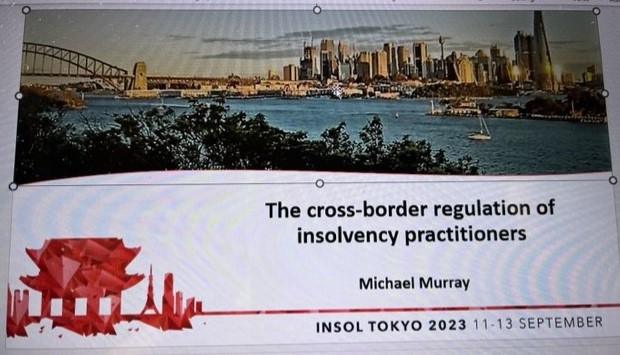Cross-border and international
Insolvency law terms – what do they mean?
14/05/2024
language
While insolvency law uses many and varied terms to describe its various processes for dealing with an insolvent business, no ...
Insolvency law’s elephants in the room
13/05/2024
INSOL Academics PJC Insolvency Inquiry 2022
Professor Jason Harris and I will be presenting a session at INSOL Academics Colloquium in San Diego USA on 22 ...
NZ insolvency practitioner sanctioned
01/12/2023
co-regulation NZICA New Zealand insolvency
A sanction of a New Zealand liquidator for the poor handling of his matters provides an illustration of New Zealand’s ...
“Shock horror – insolvent people don’t have many assets”
27/11/2023
assetless
While we wait for the useful annual statistics from AFSA as to dividend returns in bankruptcies in 2022-2023,* an insolvency ...
Australia on a slide? [continued]
16/11/2023
AML/CTF corruption
While I need to update my February 2022 comments below, and note for example that the government has now given ...
Insolvent trading in context
Insolvent trading is one of the many items for review recommended by the Parliamentary Joint Committee report on Corporate Insolvency. ...
Regulation of firms offering insolvency services
17/10/2023
co-regulation single insolvency regulator firms
Further to my earlier post on insolvency practitioner (IP) regulation in the UK, and contrary to expectations,[1] the UK government ...
Voluntary administrators removed as NZ interim liquidators of debtor on independence grounds
14/10/2023
independence
Following the appointment by the New Zealand High Court of Australian voluntary administrators of Probis as New Zealand interim liquidators ...
Some insolvency law reform ideas from Scotland and New Zealand
“ … the state is, effectively, paying insolvency practitioners to end the life of small companies … a sub-optimal solution ...
The cross-border regulation of insolvency practitioners – insights from INSOL Tokyo
26/09/2023
Cross-border insolvency practitioner regulation
I was invited to present at the INSOL International Academic Colloquium on 12 September 2023 in Tokyo on the panel ...
Australian voluntary administrators appointed as New Zealand interim liquidators
21/09/2023
liquidator registration New Zealand insolvency
In Insolvency licensing bodies confirmed for New Zealand’s new regulatory regime – Murrays Legal, of August 2020, I explained the ...
Cross-border regulation of insolvency practitioners – INSOL Tokyo – where are the government regulators?
This commentary has now been updated. See The cross-border regulation of insolvency practitioners – Murrays Legal ============================================== I was pleased ...
UK personal insolvency reforms – summary of responses and next steps
13/08/2023
Attorney-General PJC Insolvency Inquiry 2022 Bankruptcy roundtable 2023 UK personal insolvency
In my comments of July 2023 following, I reviewed the 2022 call for evidence in the UK on reform of ...
Principles of Regulation of Insolvency Practitioners – an international standard
This comment was issued in October 2018; it is re-issued in May 2023, but not updated, for interest. The rather ...
World Bank’s B-Ready Report on country business systems, including on the efficiency of corporate insolvency systems
05/05/2023
World Bank B-Ready report SME
This explains the World Bank’s new Business Ready initiative, which will report on the business systems of up to 180 ...
Personal insolvency reform in Australia
03/02/2023
personal insolvency PJC
The government is convening a “national roundtable with key stakeholders” on 2 March 2023 in relation to personal insolvency law ...
DOCAs – should ‘not much of a return to creditors but better than the liquidation alternative’ be enough?
22/01/2023
DOCA derisory dividends
Issued June 2021, re-issued January 2023 The WA Supreme Court has dismissed a challenge to deeds of company arrangement (DOCAs) ...
How low can we go – funding the insolvencies of assetless estates
Obvious as it is to say, insolvency involves limited or no money, and how to fund its existence as a ...
Insolvent assetless MSMEs – all but forgotten?
14/12/2022
articles regulation technology assetless companies
My commentary of October 2020 is re-issued, for readers’ interest. Does it matter that a company is insolvent such that ...
International insolvency regulators’ conference – some current comparative issues
The International Association of Insolvency Regulators’ Annual Conference was held in England from 26-29 September 2022. Australia’s reported contribution to ...
International insolvency case law from New Zealand and the UK
The universal nature of much of insolvency law is such that many of its principles apply across jurisdictions, with a ...
Class actions and litigation funding – New Zealand law reform report
24/07/2022
class actions litigation funding
While Australia is in the midst of some potential change in the law about litigation funding,[1] the New Zealand Law ...
Who should pay for the costs of the administration of an insolvency?
11/06/2022
articles UK fees for going bankrupt
A debtor in Australia pays no fee to have themselves made voluntarily bankrupt. If that does not seem odd, then ...
Insolvency practitioner regulation – an Australian story
18/05/2022
co-regulation practitioner regulation
With the UK government rethinking the regulation of its insolvency practitioners (IPs), moving away from co-regulation to a system more ...
Categories
Main Menu
























